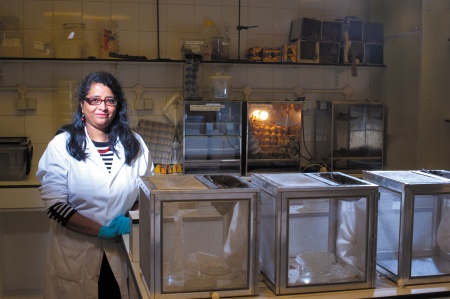A scientist from the University of Nottingham has received nearly £2.5million from the European Research Council (ERC), to continue her research into the understanding of rapid atypical cell division, which could help to control transmission of malaria.
Professor Rita Tewari from the School of Life Sciences at the University is one of only 253 leading researchers from across Europe who will receive the funding as part of the ERC’s 2021 Advanced Grants Competition.
The grants are designed to support excellent scientists and scholars in any field within Europe, who are established research leaders with a recognised track record of research achievements.
Rita Tewari is a Professor of Parasite Cell Biology. Her research focuses on the molecular players involved in the transmission and development of the malaria parasite - one of the biggest killers in the world.
The funding from this grant will enable Professor Tewari and her team to better understand unusual cell division of the malaria parasite, and how this could be used to control the transmission of the disease.
Cell division is a fundamental process that enables an organism to proliferate, propagate and survive. The molecules controlling the process, in terms of the cell cycle and chromosome replication and segregation are well studied in many model organisms, including yeast, Drosophila and humans. However, these models represent only a limited view of the diversity of eukaryotic cell division.

Professor Tewari said: “In a world where transmission of pathogens, drug resistance and global warming is alarming, our understanding of the molecular mechanisms of apicomplexan malaria parasite replication and transmission is limited and needs to be improved substantially.
“I am therefore delighted to receive this funding to help unravel this important area of scientific research. This is my dream project and I hope to deliver a new integrated, holistic view of parasite rapid and unconventional cell division and broaden our understanding and importance of evolutionarily conserved and divergent mechanisms of cell division. The study will also help to reveal potential targets for intervention in the control of malaria.”
Professor Dame Jessica Corner, the Pro-Vice-Chancellor for Research and Knowledge Exchange at the University, said: “Professor Tewari’s research into malaria is truly life changing, and we are immensely proud of everything she has achieved to date. This highly coveted and prestigious grant from the ERC is further testimony to the importance of the work she does, and the University is delighted that it will enable her to further forward her work into the future eradication of this awful disease.”
Story credits
More information is available from Professor Rita Tewari from the School of Life Sciences via email rita.tewari@nottingham.ac.uk
Charlotte Anscombe - Media Relations Manager - Faculty of Medicine and Health Sciences
Email: charlotte.anscombe@nottingham.ac.uk
Phone: 0115 748 4417
Location:
Our academics can now be interviewed for broadcast via our Media Hub, which offers a Quicklink fixed camera and ISDN line facilities at Jubilee campus. For further information please contact a member of the Press Office on +44 (0)115 951 5798, or via email pressoffice@nottingham.ac.uk
For up to the minute media alerts, follow us on Twitter
Notes to editors:
The University of Nottingham is a research-intensive university with a proud heritage. Studying at the University of Nottingham is a life-changing experience and we pride ourselves on unlocking the potential of our students. We have a pioneering spirit, expressed in the vision of our founder Sir Jesse Boot, which has seen us lead the way in establishing campuses in China and Malaysia - part of a globally connected network of education, research and industrial engagement. Ranked 103rd out of more than 1,000 institutions globally and 18th in the UK by the QS World University Rankings 2022, the University’s state-of-the-art facilities and inclusive and disability sport provision is reflected in its crowning as The Times and Sunday Times Good University Guide 2021 Sports University of the Year. We are ranked eighth for research power in the UK according to REF 2014. We have six beacons of research excellence helping to transform lives and change the world; we are also a major employer and industry partner - locally and globally. Alongside Nottingham Trent University, we lead the Universities for Nottingham initiative, a pioneering collaboration which brings together the combined strength and civic missions of Nottingham’s two world-class universities and is working with local communities and partners to aid recovery and renewal following the COVID-19 pandemic.
Posted on Monday 9th May 2022